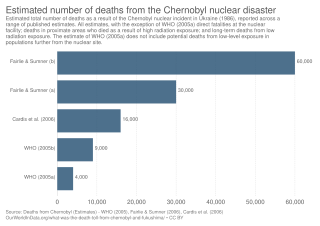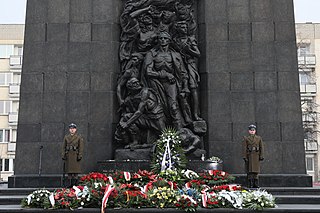Related Research Articles
April is the fourth month of the year in the Gregorian calendar, the fifth in the early Julian, the first of four months to have a length of 30 days, and the second of five months to have a length of less than 31 days.

The International Atomic Energy Agency (IAEA) is an international organization that seeks to promote the peaceful use of nuclear energy, and to inhibit its use for any military purpose, including nuclear weapons. The IAEA was established as an autonomous organization on 29 July 1957. Though established independently of the United Nations through its own international treaty, the IAEA Statute, the IAEA reports to both the United Nations General Assembly and Security Council.

United Nations Day is an annual commemorative day, reflecting the official creation of the United Nations on 24 October 1945. In 1947, the United Nations General Assembly declared 24 October, the anniversary of the Charter of the United Nations, to "be devoted to making known to the people of the world the aims and achievements of the United Nations and to gaining their support for" its work.

The Chernobyl Nuclear Power Plant, officially the Vladimir Lenin Nuclear Power Plant, is a closed nuclear power plant located near the abandoned city of Pripyat in northern Ukraine 16.5 kilometers (10 mi) northwest of the city of Chernobyl, 16 kilometers (10 mi) from the Belarus–Ukraine border, and about 100 kilometers (62 mi) north of Kyiv. The plant, named after Vladimir Lenin, was cooled by an engineered pond, fed by the Pripyat River about 5 kilometers (3 mi) northwest from its juncture with the Dnieper.
Adi Patricia Roche is an Irish activist, anti-nuclear advocate, and campaigner for peace, humanitarian aid and education.

The Chernobyl disaster was a nuclear accident that occurred on 26 April 1986 at the No. 4 reactor in the Chernobyl Nuclear Power Plant, near the city of Pripyat in the north of the Ukrainian SSR in the Soviet Union. It is considered the worst nuclear disaster in history both in cost and casualties. It is one of only two nuclear energy accidents rated at seven—the maximum severity—on the International Nuclear Event Scale, the other being the 2011 Fukushima nuclear disaster in Japan. The initial emergency response, together with later decontamination of the environment, involved more than 500,000 personnel and cost an estimated 18 billion Soviet rubles—roughly US$68 billion in 2019, adjusted for inflation.

Chernobyl Children International (CCI) is a non-profit, international development, medical, and humanitarian organisation that works with children, families and communities that continue to be affected by the economic outcome of the 1986 Chernobyl accident. The organisation's founder and chief executive is Adi Roche. Before 2010, it was known as Chernobyl Children's Project International (CCPI).

The 1986 Chernobyl disaster triggered the release of radioactive contamination into the atmosphere in the form of both particulate and gaseous radioisotopes. As of 2022, it was the world's largest known release of radioactivity into the environment.

Chernobyl liquidators were the civil and military personnel who were called upon to deal with the consequences of the 1986 Chernobyl nuclear disaster in the Soviet Union on the site of the event. The liquidators are widely credited with limiting both the immediate and long-term damage from the disaster.

The International Holocaust Remembrance Day, or the International Day in Memory of the Victims of the Holocaust, is an international memorial day on 27 January that commemorates the victims of the Holocaust, which resulted in the murder of one third of the Jewish people, along with countless members of other minorities between 1933 and 1945 by Nazi Germany, an attempt to implement their "final solution" to the Jewish question. 27 January was chosen to commemorate the date that Auschwitz concentration camp was liberated by the Red Army in 1945.
Chernobyl Heart is a 2003 documentary film by Maryann DeLeo. The film won the Best Documentary Short Subject award at The 76th Academy Awards.

The Red Forest is the ten-square-kilometre (4 sq mi) area surrounding the Chernobyl Nuclear Power Plant within the Exclusion Zone located in Polesia. The name "Red Forest" comes from the ginger-brown color of the pine trees after they died following the absorption of high levels of ionizing radiation from the Chernobyl accident on 26 April 1986. In the post-disaster cleanup operations, the Red Forest was bulldozed and buried in "waste graveyards". The site of the Red Forest remains one of the most contaminated areas in the world today.
United Nations General Assembly resolution 60/7 on Holocaust remembrance called for the establishment of a programme of outreach on the subject of the "Holocaust and the United Nations" and measures to mobilize civil society for Holocaust remembrance and education, in order to help to prevent future acts of genocide. Since its establishment by the Department of Public Information in January 2006, the Holocaust and the United Nations Outreach Programme has developed an international network of civil society groups and a multi-faceted programme that includes: innovative online educational products, youth outreach, DVDs, seminars and training programmes, a film series, book signings, a permanent exhibit at United Nations Headquarters in New York City, and the annual worldwide observance of the International Day of Commemoration in memory of the victims of the Holocaust.
The Chernobyl disaster, considered the worst nuclear disaster in history, occurred on 26 April 1986 at the Chernobyl Nuclear Power Plant in the Ukrainian Soviet Socialist Republic, then part of the Soviet Union, now in Ukraine. From 1986 onward, the total death toll of the disaster has lacked consensus; as peer-reviewed medical journal The Lancet and other sources have noted, it remains contested. There is consensus that a total of approximately 30 people died from immediate blast trauma and acute radiation syndrome (ARS) in the seconds to months after the disaster, respectively, with 60 in total in the decades since, inclusive of later radiation induced cancer. However, there is considerable debate concerning the accurate number of projected deaths that have yet to have occurred due to the disaster's long-term health effects; long-term death estimates range from up to 4,000 for the most exposed people of Ukraine, Belarus, and Russia, to 16,000 cases in total for all those exposed on the entire continent of Europe, with figures as high as 60,000 when including the relatively minor effects around the globe. Such numbers are based on the heavily contested Linear no-threshold model.

The following table compares the nuclear accidents at the Chernobyl (1986) and Fukushima Daiichi (2011) nuclear power plants, the only INES level 7 nuclear accidents to date.
Alla Yaroshinskaya is a Ukrainian politician and journalist. She was a member of the Supreme Soviet from 1989 to 1991, Deputy to the Minister of Press and Information until 1993, and then Adviser to the Russian President Boris Yeltsin and member of the Russian Presidential Council. She has been a prominent campaigner for perestroika and for better aid and information following the Chernobyl disaster. She was President of the Ecological Charity Fund, and is Co-chair of the Russian Ecological Congress, Chief of the Federal Council of the all-Russian Social Democratic Movement and a member of other international committees. She is author or co-author of over 20 books and over 700 articles on freedom of speech, human rights, nuclear ecology and nuclear security.
Nikolai Dmitrievich Tarakanov is a former Soviet military leader, doctor of technical sciences, member of the Presidium of the Russian Academy of Natural Sciences, founder and chairman of the Coordination Council of the Presidential Club Trust, Center for Social Protection of Persons with Disabilities, a member of the Union of Russian Writers, laureate of the M.A. Sholokhov International Literary Prize.
The Chernobyl Exclusion Zone was captured by Russian Armed Forces on 24 February 2022, during the first day of the 2022 Russian invasion of Ukraine. Russian forces invaded from Belarus and seized the area of the Chernobyl Nuclear Power Plant by the end of that day. By 7 March, around 300 people were trapped at the power plant since its capture. On 31 March, it was reported that most of the Russian troops had withdrawn as part of a regrouping of Russian forces in the area.
References
- ↑ "Резолюция, принятая ГА ООН 20 ноября 2007 года, A/RES/62/9 «Укрепление международного сотрудничества и координация усилий в деле изучения, смягчения и минимизации последствий чернобыльской катастрофы» п.13" (PDF) (in Russian). Retrieved 2017-09-09.
- ↑ "International Chernobyl Disaster Remembrance Day 26 April". United Nation.